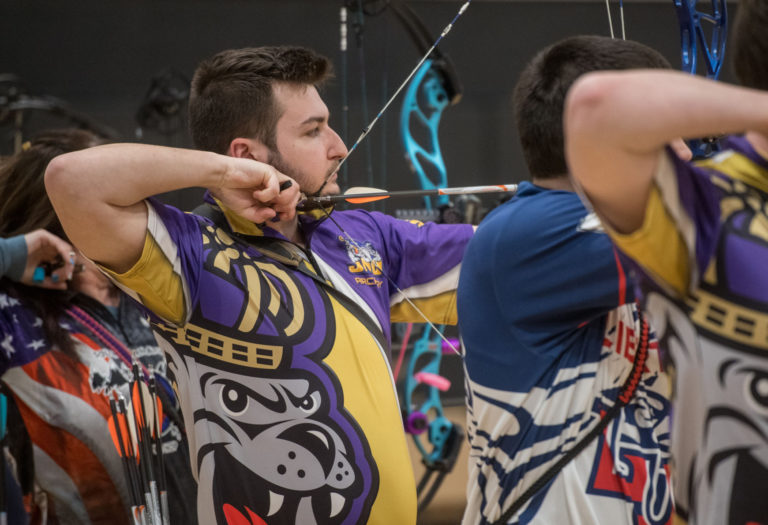There was always an interest in bows and arrows for Bob Ryder.
And when he was 5, his parents offered a treat after his tonsils were removed.
Expectedly, they figured he’d say ice cream or maybe even a trip to the store.
Instead, Ryder insisted that he be rewarded with his own bow and arrow.
“I was thrilled,” Ryder said.
What started as a toy bow with two suction-cupped arrows quickly grew into a full-fledged passion for the sport as he began bowhunting with his father, practicing daily around his house, and his dad joined a Field Archery Club by the time Ryder was 7.
“One day, he told me if I wanted to shoot that bad, he would get me a bow,” Ryder recalled. “When he brought home a used bow small and light enough to draw weight for me to shoot, it was game on. I practiced and got pretty good with it, and he took me to shoot my first tournament when I was 8. I came in second, and the fire was lit. I told him that I was going to practice and the next time I got to shoot, I wasn’t going to lose.”

Nearly 40 years later, Ryder serves as the Shenandoah Valley Target Archers president, the U.S. National Indoor Archery Championships tournament director, and an assistant coach for the James Madison University archery club team.
Ryder, a JMU alum, said he won state titles at ages 11 and 12, later getting strong enough in the sport to start beating his dad and getting uninvited to accompany him as a result.
Once he got to Harrisonburg and attended JMU, he found out there was an archery competition. That fire that had started to dwindle for Ryder was suddenly lit again.
“When I got to JMU, I met with the coach and she explained that they only had a women’s team,” Ryder remembered. “I argued that Madison College just added men to their campus and they should consider adding a men’s team. I renewed the discussion with her on a regular basis until she eventually agreed to add two men to the archery team so they could at least enter mixed team events (two men and two women).”
Ryder’s persistence paid off as the Dukes’ archery team went undefeated through the first season and began facing opponents from all over the south the following year.
Quickly, the school realized how successful the program was and added a full men’s team to the travel budget. JMU reached nationals in 1972 and has yet to look back.
“The reason I think archery is great for all kids is that they don’t have to be rich, good-looking, popular or the son of the coach and they don’t have to be judged subjectively,” Ryder said. “Everyone must earn their success and recognition on their own. You can become as good as you decide to become and as successful as your work ethic dictates.”
The U.S. National Archery Championships were most recently held close to home for those currently competing for the Dukes, as Horizons Edge continued its longstanding commitment to the organization and allowed the teams to compete just last month.
“I have served as tournament director of over 60 national championships in various disciplines in five different states and 10 different venues,” Ryder said. “I must say that Ashley Henry and the staff at Horizon’s Edge have done a wonderful job.”
Henry, who also serves as the Page County High volleyball head coach, and the staff at Horizons Edge have fully embraced the sport’s excitement in its facility.
And quickly, those involved are seeing the growth firsthand with increased attendance each time, more interest from those around the community, and excitement all around.
“If anyone out there has tried archery recreationally and liked it, and may be interested in taking it to a more serious level, I would highly recommend looking into competitive archery,” said JMU archery club president Will Bornschein. “It allows you to improve yourself, make lifelong connections and friendships, and partake in a very fun activity.”
Like other sports, Bornschein said the key to archery comes between the ears.
If a player’s mental game is struggling, the results will follow. With the Dukes, he said the coaching staff had helped the current players quickly learn how to be successful.
“This is something our team at JMU has been fortunate to have learned from our coaches,” Bornschein said. “Learning the proper form to shoot can take a few weeks to a couple months, but mastering the mind while competing takes years.”
Like Ryder, Bornschein got into archery when he was young and in Boy Scouts before eventually discovering the competitive side of the sport at James Madison.
Now, he can’t imagine being involved and knows he has a lifelong hobby ahead.
“It has been an amazing experience allowing me to create meaningful relationships with so many people, and challenge myself through the sport,” Bornschein said.
Written By: Cody Elliot, Staff Writer